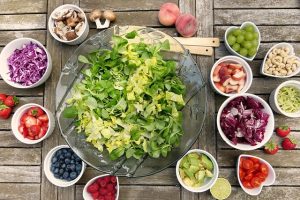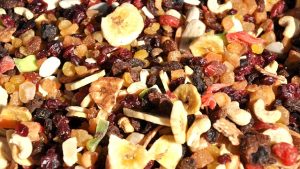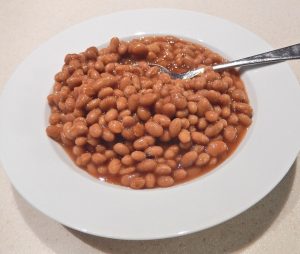Foods that do not require cooking
 These can be consumed raw. Some examples include:
These can be consumed raw. Some examples include:
- Fruits: Apples, bananas, berries, grapes, melons, oranges, etc.
- Vegetables: Carrots, celery, cucumbers, lettuce, bell peppers, tomatoes, etc.
- Nuts and seeds: Almonds, walnuts, peanuts, sunflower seeds, etc.
- Dairy products: Milk, yogurt, cheese, etc.
- Seafood: Sushi, sashimi, oysters, etc.
- Deli meats: Ham, turkey, roast beef, etc.
- Condiments and dips: Hummus, salsa, guacamole, etc.
It is important to note that some raw foods, especially raw animal products, may contain harmful bacteria or pathogens that can cause food poisoning if not properly handled and stored. So it’s always a good idea to properly wash and clean raw foods before consuming them.
Other no cook foods can be purchased ready cooked, such as
- Bread
- Scones
- Pancakes
- Crackers and other bakery goods
Budget No Cook foods
Here are some inexpensive foods that do not need to be cooked:
- Rice cakes: They are a simple, crunchy snack that can be topped with peanut butter, cheese, or fruit.
- Canned beans: Beans such as chickpeas, black beans, and kidney beans can be used in salads or as a snack when rinsed and drained.
- Canned fruits and vegetables: Canned fruits and vegetables are a convenient and budget-friendly option for adding to meals or snacking on.
- Peanut butter: A staple ingredient in many kitchens, peanut butter can be used in recipes, as a spread on bread, or as a dip for fruits and crackers.
- Bread: Whole grain breads are a great source of fiber and can be used to make sandwiches, toast, or as a base for bruschetta.
- Crackers: A variety of crackers are available in grocery stores and can be enjoyed with cheese, peanut butter, or hummus.
- Yogurt: Yogurt is a nutritious and delicious food that can be eaten on its own, used as a base for smoothies, or as a topping for granola.
- Tuna: Canned tuna is a cheap source of protein that can be used in salads, sandwiches, or as a snack on crackers.
- Eggs: Hard-boiled eggs make a great snack or can be added to salads or sandwiches.
- Cheese: Different varieties of cheese, such as cheddar, mozzarella, and Swiss, can be enjoyed on crackers or as a snack.
- Salami: Salami is a type of cured meat that can be sliced and enjoyed as a snack or added to sandwiches and salads.
- Apples: Apples are a sweet and crunchy fruit that can be eaten as a snack on their own or paired with peanut butter or cheese.
- Carrots: Carrots are a crunchy and sweet vegetable that can be eaten raw as a snack or added to salads.
- Grapes: Grapes are a sweet and juicy fruit that make a great snack on their own or can be used in fruit salads.
- Celery: Celery is a crunchy and hydrating vegetable that can be eaten raw as a snack or added to salads and dips.
- Fresh herbs: Fresh herbs like parsley, cilantro, and mint can be added to sandwiches, salads, and dips to add flavor and nutrition.
These are just a few examples of budget-friendly foods that don’t need cooking. You can also get creative and mix and match ingredients to create delicious and nutritious meals and snacks. Remember, you can always get creative with ingredients and come up with your own recipes to make delicious and nutritious meals and snacks.
No Cook Camping Foods
You can pretend to be camping to make eating no cook foods more fun, or you might actually want to go camping without the hassle of cooking. When camping, it can be convenient to have food that doesn’t need cooking since it reduces the need for cooking equipment and fire. Here are some good options for camping food that don’t need to be cooked:
- Trail mix: A combination of nuts, seeds, dried fruit, and chocolate makes for a satisfying and portable snack.
- Energy bars: Energy bars are a quick and easy snack that can be eaten on the go.
- Jerky: Beef, turkey, or other types of jerky are a high-protein snack that doesn’t need to be cooked.
- Fruits: Fresh fruit like apples, bananas, and grapes are a healthy and refreshing snack that don’t need to be cooked.
- Vegetables: Carrots, cherry tomatoes, and celery are crunchy and hydrating vegetables that can be enjoyed raw.
- Cheese: Hard cheese like cheddar and Swiss can be sliced and packed for snacking.
- Crackers: Crackers make a great snack on their own or with cheese, peanut butter, or hummus.
- Peanut butter: Peanut butter can be spread on crackers, bread, or fruits for a quick and satisfying snack.
- Dried fruit: Dried fruits like raisins, apricots, and cranberries make for a sweet and nutritious snack.
- Nuts: Nuts like almonds, cashews, and walnuts are a high-protein snack that can be enjoyed on their own or as part of trail mix.
- Tuna: Canned tuna can be packed in a cooler and used as a protein source in sandwiches or salads.
- Salsa: Salsa can be used as a dip for vegetables or crackers, or as a topping for sandwiches.
- Hummus: Hummus is a dip made from chickpeas, tahini, and seasonings that can be enjoyed with vegetables or crackers.
- Guacamole: Guacamole is a dip made from avocados, lime juice, and seasonings that can be enjoyed with vegetables or crackers.
- Olives: Olives make for a salty and flavorful snack that can be enjoyed on their own or added to salads and sandwiches.
- Pickles: Pickles are a crunchy and tangy snack that can be enjoyed on their own or added to sandwiches.
Remember to pack these foods in a cooler or insulated bag to keep them fresh, especially during hot weather. And, when camping in bear country, it’s important to properly store food to avoid attracting wildlife. These are just a few examples of camping food that doesn’t need to be cooked. When planning your camping trip, or even pretend camping, it’s always a good idea to think about the food options that will be available and to bring a variety of nutritious and satisfying snacks and ingredients.
Nutritious No Cook Food for kids
Here are some nutritious food options for kids that don’t need to be cooked:
- Fruits: Fresh fruits like apples, bananas, grapes, and berries are a sweet and healthy snack that kids love.
- Vegetables: Carrots, cherry tomatoes, cucumbers, and celery are crunchy and hydrating vegetables that can be enjoyed raw.
- Yogurt: Yogurt is a good source of protein and calcium that can be enjoyed on its own or topped with fruit or granola.
- Cheese: Cheese sticks or blocks can be sliced and packed for snacking, or added to sandwiches and salads.
- Hard-boiled eggs: Hard-boiled eggs make a great snack or can be added to salads and sandwiches.
- Nuts: Nuts like almonds, walnuts, and cashews are a high-protein snack that can be enjoyed on their own or as part of a trail mix. Remember safety precautions with small children. No nuts for under 4s.
- Nut butters: Nut butters like peanut and almond butter can be spread on crackers, bread, or fruit for a quick and satisfying snack.
- Hummus: Hummus is a dip made from chickpeas, tahini, and seasonings that can be enjoyed with vegetables or crackers.
These are just a few examples of nutritious food options for kids that don’t need to be cooked. Encourage kids to try new foods and find their own favorites, and remember to always offer a variety of healthy options.
Best No Cook Foods To Give To Food Banks
- Canned goods: Canned fruits, vegetables, beans, soups, and stews are a great option for food banks as they have a long shelf life and provide a variety of nutritious options. Most can be eaten straight from the tin if necessary.
- Rice: Rice is a staple food that is easy to store and can be used in a variety of dishes but needs cooking.
- Pasta: Pasta is another staple food that is easy to store and can be used in a variety of dishes but also needs cooking.
- Peanut butter: Peanut butter is a high-protein food that can be used in a variety of ways, including as a spread, in sauces, and in baking. It can be eaten straight from the jar or tub.
- Canned or dried beans: Beans are a great source of protein and can be used in a variety of dishes. Dried beans will need cooking and often soaking before use.
- Canned fish: Canned fish like tuna and salmon are a great source of protein and can be used in a variety of dishes. Most of these can be eaten straight from the tin.
- Oatmeal: Oatmeal is a nutritious and filling breakfast option that can be enjoyed on its own or used in baking but requires cooking and sometimes overnight soaking.
- Crackers: Crackers make a great snack on their own or with cheese, peanut butter, or hummus. They can often substitute for bread and are instantly available to eat.
- Coffee and Tea. A hot drink can be very helpful to those needing help from foodbanks.
Remember to check the expiration date of the food you donate and only donate items that are within their shelf life. Also, consider the dietary restrictions of those who will be receiving the food, and try to donate items that are free from common allergens, such as peanuts and gluten.
Best No Cook Food To Donate To Homeless People
- Sandwiches, fresh made or fresh from the shop. If you know the homeless people you are donating to, be mindful of their dietary needs and preferences.
- Cooked quiches, sausage rolls, pies or other fresh made goods from a bakery, provided you know they will be eaten in a short time and not kept to become unhygienic.
- Canned goods: Canned fruits, vegetables, beans, soups, and stews are a great option for homeless people as they have a long shelf life and provide a variety of nutritious options. Make sure the person has a can opener and spoon.
- Peanut butter: Peanut butter is a high-protein food that can be used in a variety of ways, including as a spread, in sauces, and in baking, but can also be eaten straight from the tub or jar.
- Canned or dried beans: Beans are a great source of protein and can be used in a variety of dishes. Make sure they are not the kind that need boiled before eating. Some beans can make people very ill if they are not cooked for at least 10 minutes.
- Canned fish: Canned fish like tuna, mackerel, sardines and salmon are a great source of protein and can be used in a variety of dishes. (Remember a can opener or choose ones with an easy open top) A fork or spoon is useful!
- Crackers: Crackers make a great snack on their own or with cheese, peanut butter, or hummus.
- Energy bars: Energy bars can provide a quick and convenient source of energy and nutrition on the go.
- Jerky: Beef, turkey, or vegetable jerky can provide a high-protein snack that is easy to store and transport.
- Fresh fruit: Fresh fruit like apples, bananas, and oranges can provide a sweet and nutritious snack.
Remember to consider the dietary restrictions of those who will be receiving the food, and try to donate items that are free from common allergens, such as peanuts and gluten. Also, be mindful of the storage and transportation options for homeless individuals, and donate items that are easy to carry and store.
Best Foods To Store At Home For Power Cuts
- Canned goods: Canned fruits, vegetables, beans, soups, and stews are a great option as they have a long shelf life and provide a variety of nutritious options.
- Peanut butter: Peanut butter is a high-protein food that can be used in a variety of ways, including as a spread, in sauces, and in baking.
- Crackers: Crackers make a great snack on their own or with cheese, peanut butter, or hummus.
- Energy bars: Energy bars can provide a quick and convenient source of energy and nutrition.
- Jerky: Beef, turkey, or vegetable jerky can provide a high-protein snack that is easy to store and transport.
- Nuts and seeds: Nuts and seeds make a great snack on their own or as part of a trail mix, and are a good source of protein and healthy fats.
- Dried fruit: Dried fruit like raisins, cranberries, and apricots can provide a sweet and nutritious snack.
- Cheese: Cheese can be sliced and enjoyed on its own, or added to crackers or sandwiches.
Remember to consider the storage conditions of the food, as some items may require refrigeration even if they don’t need to be cooked. When storing food for an extended period of time, it’s a good idea to rotate items so that they are consumed before their expiration date.
All of these foods can help you when camping or for prepping or for surviving hard times at home.
 Whether you’re out camping with no fire, an at home parent with no money for fuel, a student or a professional, if you don’t have cooking facilities or the time to cook a meal, you can still find quick and easy no cook food. With just a few staples, you’ll have delicious meals on the table in no time! Whether you want breakfast, lunch, dinner or snacks, you’ll find a variety of quick and easy no cook food options that will fit your family’s needs.
Whether you’re out camping with no fire, an at home parent with no money for fuel, a student or a professional, if you don’t have cooking facilities or the time to cook a meal, you can still find quick and easy no cook food. With just a few staples, you’ll have delicious meals on the table in no time! Whether you want breakfast, lunch, dinner or snacks, you’ll find a variety of quick and easy no cook food options that will fit your family’s needs. Can’t Heat or Cook
Can’t Heat or Cook